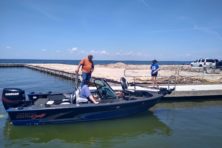Will Door County Boaters Go Green?
- Share
- Tweet
- Pin
- Share
Hybrid technology has taken root in the auto industry, and fuel efficiency in cars is back in vogue, but powerboats often get less than one mile per gallon of fuel. As oil supplies continue to decline, will the technology of the auto industry migrate to the water?
Hybrid technologies, especially solar power, have been investigated by boat makers across the world. Sea Ray has even gone so far as to make a prototype 24-foot Sundancer Hybrid, powered by solar panels on the top of the boat and twin diesel engines. But those in the area boating industry are skeptical of the feasibility of bringing those concepts into the consumer market.
“Technology would have to really go through a development phase for it to work,” says Patrick O’Hern, CEO of Bay Shipbuilding Company in Sturgeon Bay. O’Hern also expressed concerns about crew safety on larger vessels “if there is no failsafe method of propulsion.”
Others assert that even high gas prices haven’t dampened boating enthusiasm by much.
“You see less and less boats leave the docks,” says Mike Asher, salesman for Skipper Bud’s. “But what I see is power boaters maybe taking one less trip a year.”
Fish Creek resident and avid boater Greg Swain says other factors are also affecting how often boaters go out.
“Gas prices haven’t changed our patterns, but it doesn’t help,” Swain says. “I don’t know if it’s gas prices as much as it’s a change in lifestyle for people. In the old days when we used to go up north we used to see just tons and tons of boats. Now because families are so busy you don’t see as many out.”
Power boating is still a major part of summer for many, however, and as experts fear that oil reserves could dry up more quickly than expected, the industry may soon be forced to adapt. So far, advances have been slow to come.
“In general, most of the technology change has been in the green diesel,” says Hoyt Purinton, president of the Washington Island Ferry line. Purinton says the ferry line has used ultra low-sulfur diesel to some extent, and that it is “seeing 15 percent fuel savings.”
“If the auto industry makes adaptations, I think the boating industry will follow suit,” says Jay Chomeau, co-owner of the Door County Mariners Club in Fish Creek, regarding hybrid technology.
“I think it’s really going to be something where people in design will have to see eye to eye and move together,” Purinton says. “We learn from the trial-and-error of the on-the-road market. Anything we do has to go through Coast Guard approval. It really has to be something that’s tried and tested, and luckily others are doing that.”
If hybrid boats do become widespread, Swain says he would definitely consider buying one.
“Because I own a hybrid car already, I can clearly see the advantages that a hybrid boat would offer,” he says. “I do a lot of fishing, and at low speeds like when you’re fishing the electric motors kick in.”
The Mariners Club is one example of another solution to rising costs for power boaters. In boat clubs, a group of boaters collectively own multiple vessels, and members then pay to use the boats, rather than owning one themselves. The Door County Mariners Club owns three small vessels ranging from 21 to 26 feet in length, and offers seasonal, monthly, and per usage plans.
“Boat clubs in general have grown 83 percent in the past four years,” Chomeau says. “With the economy the way it is and people looking at where their money is going, it’s just a way to keep the same lifestyle at a different price. People just have to get used to sharing something instead of owning something.”
But regardless of which course the industry takes, Swain doesn’t think power boating will go away.
“I think power boats are still going to have a niche market because they’re cottages on the water,” he says. “The people who do a lot of cruising will shift more into sails, but I think the typical power boat will still remain because so many are just used for sitting at the dock.”



